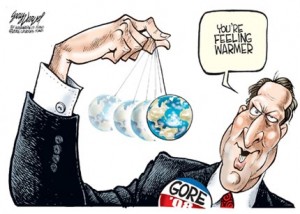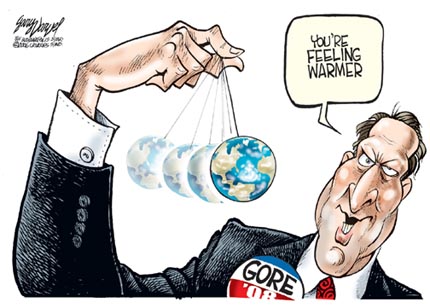 Voters strongly believe the debate about global warming is not over yet and reject the decision by some news organizations to ban comments from those who deny that global warming is a problem.
Voters strongly believe the debate about global warming is not over yet and reject the decision by some news organizations to ban comments from those who deny that global warming is a problem.
Only 20% of Likely U.S. Voters believe the scientific debate about global warming is over, according to the latest Rasmussen Reports national telephone survey. Sixty-three percent (63%) disagree and say the debate about global warming is not over. Seventeen percent (17%) are not sure.
Forty-eight percent (48%) of voters think there is still significant disagreement within the scientific community over global warming, while 35% believe scientists generally agree on the subject.
The BBC has announced a new policy banning comments from those who deny global warming, a policy already practiced by the Los Angeles Times and several other media organizations. But 60% of voters oppose the decision by some news organizations to ban global warming skeptics. Only 19% favor such a ban, while slightly more (21%) are undecided.
But then 42% believe the media already makes global warming appear to be worse than it really is. Twenty percent (20%) say the media makes global warming appear better than it really is, while 22% say they present an accurate picture. Sixteen percent (16%) are not sure.
Still, this is an improvement from February 2009 when 54% thought the media makes global warming appear worse than it is. Unchanged, however, are the 21% who say the media presents an accurate picture.
The survey of 1,000 Likely Voters was conducted on July 7-8, 2014 by Rasmussen Reports. The margin of sampling error is +/- 3 percentage points with a 95% level of confidence. Field work for all Rasmussen Reports surveys is conducted by Pulse Opinion Research, LLC.
Consistent with earlier polling is the finding that 60% of voters consider global warming a serious problem, with 37% who describe it as a Very Serious one. Thirty-five percent (35%) disagree and don’t believe global warming is that serious a problem, with 14% who say it is Not At All Serious.
But even among those voters who consider global warming a Very Serious problem, 57% say the debate is not yet over. These voters by a 49% to 34% margin also oppose the decision by some news organizations to ban global warming skeptics.
The older the voter, generally speaking, the more likely they are to believe that the debate about global warming is not over.
Most voters across all demographic categories say the debate is not over. Most also oppose the decision by some media outlets to ban global warming critics.
Men and those over 40 are more skeptical of the media’s coverage of global warming than women and younger voters are.
Sixty-four percent (64%) of Republicans and a plurality (45%) of voters not affiliated with either major political party believe the media makes global warming appear to be worse than it really is. Just 22% of Democrats agree. But Democrats also believe much more strongly than the others that global warming is a serious problem.
Twenty-seven percent (27%) of voters in President Obama’s party think the scientific debate about global warming is over, a view shared by only 12% of GOP voters and 16% of unaffiliateds.
Sixty-seven percent (67%) of all voters say they have been following recent news reports about global warming at least somewhat closely, with 33% who are following Very Closely.
Because congressional Republicans oppose most of the initiatives he has proposed, the president has signaled that he is prepared to take whatever actions he can alone to deal with a problem he attributes largely to certain human activities. However, just 30% of voters think the president should take action alone if necessary to deal with global warming. Twice as many (59%) say the federal government should only do what the president and Congress jointly agree on.
While most voters have expressed concern about global warming for years, only 41% are willing to pay more in taxes or in utility costs to generate cleaner energy and fight global warming. That includes 23% who are willing to pay no more than $100 extra a year.
. . . . . . . . . . . . . . . .
This article was published at Rasmussen Reports.
